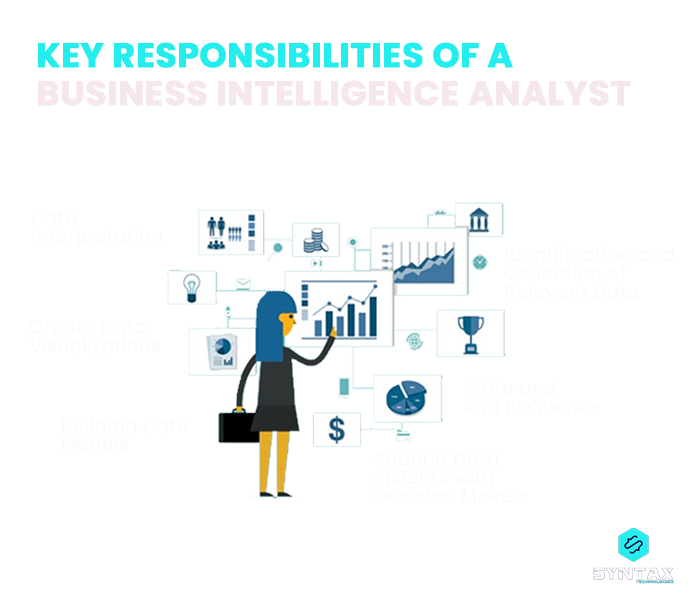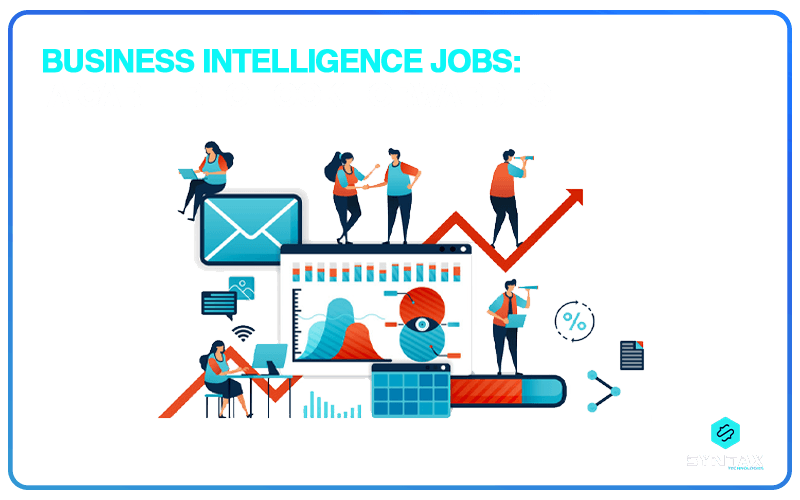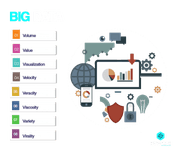Every Company has Big Data in its Future and Every Company will eventually be in the Data Business. – Thomas H. Davenport (President’s Distinguished Professor in IT and Management)
Gartner defines Big Data as high-volume, high-velocity, and/or high-variety information assets that demand cost-effective, innovative forms of processing that enable enhanced insight, decision making and process automation.
The evolution of Big Data pushed Business Intelligence to the forefront as it came to be acknowledged as the prime means for exploiting Big Data in ways which could facilitate data driven decision making. The above quote by Thomas H. Davenport, is not only an indication of the growing significance of Big Data, but also indirectly hints at the future prospects of a Business Intelligence Career in the job roles of a Business Intelligence Analyst, a Business Intelligence Manager and so on .
The entry of each organization into the data business is bound to increase the importance of Business Intelligence Jobs, by a considerable degree.
In this blog, we will look at the potential prospects of Business Intelligence Jobs. We will try to understand the Business Intelligence Career Path as well as the different BI Job Roles in the global Business Intelligence market.
What is Business Intelligence?
Business Intelligence can be understood as the technological innovation which includes the means and ways employed by business organizations for analyzing business related data. This data is generated at every step of business activity, including observation of industry trends, tracking of sales and inventory, collection of demographic information and so on.
This data may be present in structured or unstructured forms and the idea behind a Business Intelligence Job Description is to aid in the identification and creation of new opportunities for the business enterprise, by interpreting this data.
Business Intelligence involves using business administration principles such as planning, organizing, directing and controlling to gather insights from data that can be used for strategic decision-making.
Business Intelligence Skills can be understood as encompassing the competencies for Reporting, Data Analytics, Benchmarking, Data Mining, Online Analytical Processing, Prescriptive Analytics, Text Mining, Predictive Analytics and so on.
Thus, Business Intelligence Jobs entail the need to delve into the past, understand the present as well as make predictions for the future of business operations.
Wish to read more on the topic of Business Intelligence, do check out our blog on “What is Business Intelligence?“
Business Intelligence Career: Is it Worth It?
As you find yourself positioned at that point where you weigh the pros and cons of a career in Business Intelligence, you might find yourself asking yourself whether a career in BI is worth it after all. In this section, we will look at some of the most important benefits which come with Business Intelligence Jobs.
Job Security
This is an important concern for any career aspirant. You want to settle for a job, which among others is also able to guarantee you a sense of security. Business Intelligence Jobs are considered to be secured ones, precisely because they are immensely in-demand.
A Business Intelligence Developer, a Business Intelligence Consultant, a Business Intelligence Analysts and so on are considered to be crucial linkages between business thinking and technological understanding. Moreover, as business becomes more and more data-driven, the need for these personnel has increased by leaps and bounds.
Opportunity for Growth
A career in Business Intelligence is not only in-demand, but is also exciting, dynamic and offers immense opportunities for personal growth. Faced with challenges on a daily basis, BI personnel are expected to continually upgrade themselves.
For instance, a Business Intelligence Developer is expected to be competent at analyzing and understanding the needs of stakeholders and software users. Now this need is not static and they won’t be able to respond to their demands if they fail to keep themselves abreast of the latest technology.
Immense Job Prospects
One of the greatest benefits which come with Business Intelligence Jobs is the possibility of pursuing a BI Career across an array of job prospects. Moreover, you can begin your Business Intelligence Career Path at a junior or beginner level and after a definite year of experience, move on to more senior positions wherein you can manage your own team and projects.
Simultaneously, Business Intelligence Jobs are not restricted to a single industry and as a BI aspirant you might find yourself in-demand across several industries including manufacturing, education, sports, banking and so on.
For instance, since a Business Intelligence Project Manager is responsible for overseeing the planning, design, and implementation of BI solutions within an organization; they can expect to have promising career prospects as organizations increasingly adopt data-driven decision-making and seek to leverage the value of their data assets.
Business Intelligence Career Path
There is no single route to a Business Intelligence Careers and one can begin their journey at different points. If you happen to be a student, you have the benefit of having the option to choose your major. If you ultimately aim for Business Intelligence Jobs, you can perhaps opt for degrees related to domains like Management Information Systems, Business-related degrees or any branch of Computer Science.
If you happen to be someone who is about to graduate with a degree which has no relation to fields as those mentioned above, it doesn’t imply that you are not fit to become a Business Intelligence expert. You can choose the second career route which is acquisition of work experience. You can apply for an internship wherein you are able to acquire knowledge of DSS Software or you can work as a Data Visualization or Data Scientist intern which helps you gather basic hands-on experience in data analysis and Business Intelligence.
Lastly, if you happen to be someone who is already in the workforce, then you have the benefit of having experience on your side. You can carefully analyze a Business Intelligence Job Description and accordingly acquire skills which help you to grab Business Intelligence Jobs. For instance, you might aim for acquiring technical proficiency in different kinds of software, such as Structured Query Language (SQL).
It is important to remember that different Business Intelligence Jobs might emphasize upon different kinds of roles and skill sets. A back-end role might be more technically oriented such as that of a Business Intelligence Developer; while a front-end role might lay emphasis upon data usage, presentations and report generation. Thus, depending upon the job description, you might aim at acquiring the corresponding Business Intelligence Skills.
If you too are someone who is aiming to ace a Business Intelligence Interview, our curated list of important questions can certainly help you out. Do check out our blog on “Top 30 Business Intelligence Interview Questions“
Business Intelligence Jobs
In this section, we will look at some of the most prominent job roles within the field of Business Intelligence.
Business Intelligence Analyst
A BI Analyst is someone who performs the task of delving into large volumes of relevant data, in order to derive actionable insights which could push for data-driven decision making. Thus, they are BI personnel who need to have a complete understanding of the production systems, departmental databases, data warehouses and the nitty-gritty of the business processes.
They do possess an understanding of building Business Intelligence tools and Business Intelligence programs, an intrinsic understanding of SQL server Business Intelligence as well as are proficient in Data Visualization and Cloud Computing.
Key responsibilities of a Business Intelligence Analyst
1. Collecting and analyzing data from internal sources, external sources, and customers to identify trends and patterns in the business.
2. Developing reports and dashboards that enable stakeholders to easily interpret the data insights.
3. Creating predictive models to forecast potential outcomes or future opportunities for the organization.
4. Utilizing advanced analytics such as SQL, visualizations, machine learning algorithms etc., to gain further insights on past or current performance of the business operations
5. Collaborating with other analysts and stakeholders within the company to ensure efficient implementation of solutions derived from analytical results.
Salary of Business Intelligence Analysts
A Business Intelligence Analyst Salary is estimated to fall within the average annual range of $70,000 to $80,000.

For a more detailed understanding of the professional designation of a BI Analyst, refer to our blog on Business Intelligence Analyst.
Business Intelligence Consultant
A Business Intelligence Consultant is expected to use his competence in designing, developing and implementing BI systems and tools. They assist organizations in learning new ways for managing their data as well as provide robust solutions for the accomplishment of business goals, for evaluating performance as well as for helping in drafting budgets, timelines, forecasts and reports.
A Business Intelligence Consultant should be proficient in understanding and manipulating statistics and data as well as should have in-depth knowledge of Data Visualization tools.
Key responsibilities of a Business Intelligence consultant
1. Developing and implementing data collection systems and other strategies that optimize statistical efficiency.
2. Analyzing data to identify trends and patterns in complex datasets.
3. Working with stakeholders to define business requirements and metrics for tracking performance.
4. Designing, developing and testing Business Intelligence solutions such as dashboards, reports, etc.
5. Creating comprehensive technical documentation including user guides and training materials for end-users of BI tools and applications.
Salary of Business Intelligence Consultants
Generally, salaries of a Business Intelligence Consultant can range from $51,000 to $125,000 per year. Consultants with more experience may earn higher salaries than those with less experience.
Business Intelligence Developer
The position of a Business Intelligence Developer is essentially a technical one as they are responsible for the creation, improvement and generation of BI solutions which ultimately help in transforming data into valuable insights. They are involved in development of ETL for facilitating data integration, in deriving extracts from SQL server as well as in the management of database applications.
A Business Intelligence Developer needs to have problem-solving capabilities, an analytical bent of mind, coupled with proficiency in Data Mining and Data Warehousing.
Key responsibilities of a Business Intelligence Developer
1. Design, develop and maintain data warehousing solutions to enable effective analysis of business data.
2. Analyze and integrate data from multiple sources into a single unified view for better decision-making support.
3. Develop reporting systems using BI tools like Tableau or PowerBI to visualize the analyzed data in meaningful ways.
4. Troubleshoot existing Business Intelligence systems and databases, as well as proactively identify potential problems in order to maximize system performance.
5. Collaborate with other teams and stakeholders in order to ensure that their information requirements are met through appropriate use of BI technologies.
Salary of Business Intelligence developers
A Business Intelligence Developer Salary is estimated to fall within the average annual range of $75,000 to $85,000.
Business Intelligence Engineer
The role of a BI Engineer is quite a comprehensive one as it refers to a Business Intelligence Job Description wherein the individual is expected to work in close collaboration with developers as well as analysts. Thus, a Business Intelligence Engineer is expected to possess the skills of a Business Intelligence Data Analyst as well as a Business Intelligence Developer.
They are responsible for streamlining the BI processes, for the strategic implementation of BI tools as well as for the managing or projects.
Key responsibilities of a Business Intelligence engineer
1. Develop tools and processes for gathering, analyzing, and reporting on data to help business decision-making.
2. Design, install, manage and maintain data warehouses and data marts.
3. Create dashboards, reports, scorecards, or other visualizations that interpret complex data sets into meaningful information.
4. Monitor data quality, accuracy and relevance by developing techniques for validating data sources.
5. Establish policies for access control and security of data assets.
Salary of Business Intelligence engineers
The average salary for a Business Intelligence Engineer is $85,998 per year in the United States. Salaries can range from $54,000 to upwards of $120,000 depending on experience and qualifications.
Business Intelligence Manager
They are responsible for the designing and implementation of BI systems and software, along with integration with data warehouses and databases. They supervise the performance and execution of BI projects as well as collaborate with operation engineers, business owners and app developers for overseeing the production of BI designs.
Key responsibilities of a Business Intelligence manager
1. Design and develop data models, databases and reporting frameworks to support business intelligence systems.
2. Monitor data quality to ensure accuracy of business intelligence solutions.
3. Manage the end-to-end process of creating reports, dashboards and other visualizations using data from multiple sources.
4. Develop and maintain business intelligence tools, applications and processes to support decision-making.
5. Analyze complex data sets to uncover trends, correlations and insights for stakeholders.
Salary of Business Intelligence managers
A Business Intelligence Manager Salary is estimated to fall within the average annual range of $100,000 to $110,000.
Conclusion
Business Intelligence, which started as a vague concept, has come to acquire significant importance especially as more and more business organizations are seeking to refine their data for deriving meaningful insights. Moreover, Business Intelligence Jobs encompass a broad spectrum of professional roles and are meant to cater multiple industries.
It offers flexibility, dynamism, growth as well as a handsome compensation. However, it is important to remember that besides acquiring theoretical knowledge, it is important to cultivate Business Intelligence Skills through hands-on experience in related technology. Acquiring a BI certification is definitely a wise proposition.
We, at Syntax Technologies, provide you with a remarkable opportunity to acquire competencies suitable for the position of a Business Intelligence expert.






